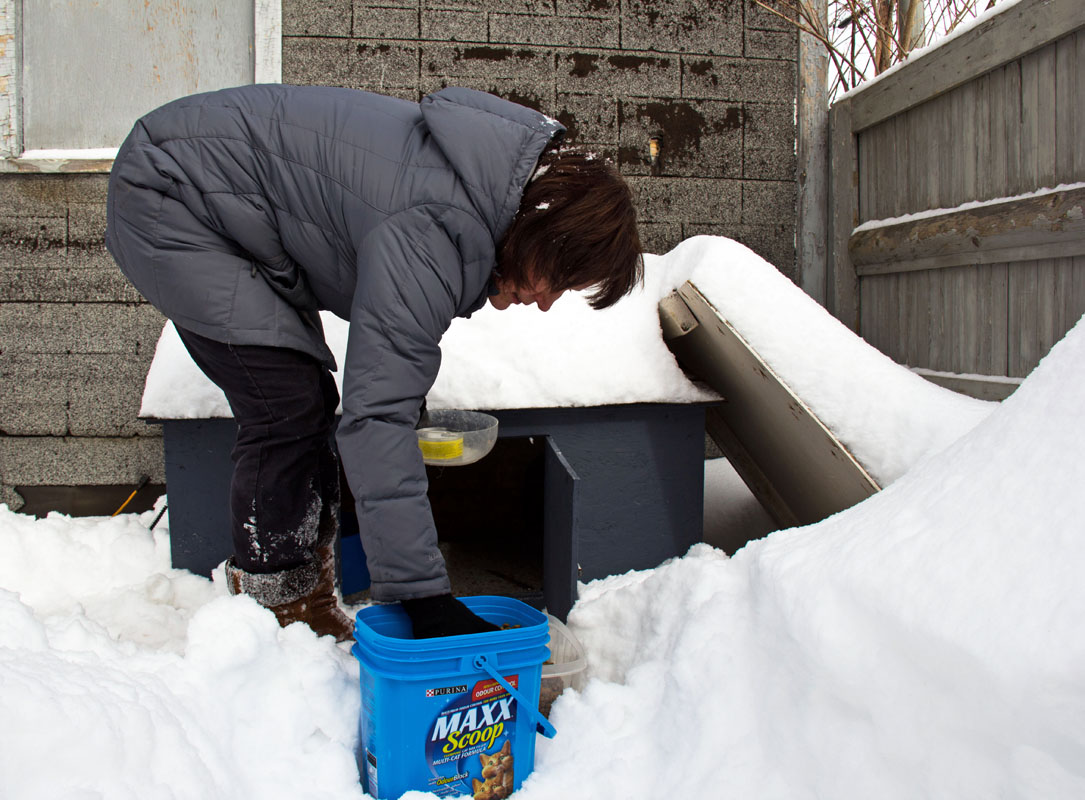 Sandra Klarer loves cats, but she’s not crazy.
Sandra Klarer loves cats, but she’s not crazy.
Klarer and roughly a hundred volunteers with People for Animals of Saskatchewan (PFA) are trying to tackle what she calls Regina’s cat over-population crisis. No one really knows how many cats roam the streets of Regina. It is estimated that there are anywhere from a few thousand to as many as 25,000.
PFA is a non-profit that rescues stray and abandoned cats and kittens in Regina and also maintains the city’s 30 feral and semi-feral cat colonies, mostly located in North Central.
The charity has been helping strays since 1983 and became a registered charity in 2009, right around the time Klarer became a volunteer.
“You can’t find a home for a feral cat. Managing the colonies is the best you can do for them… It’s not an easy life, but it’s not a horrible life (for the cats),” said Klarer.
Every day about 150 cats are fed by volunteers and, weather permitting, volunteers use the practice of trap-neuter-release (TNR) to sterilize the cats. TNR is the process of trapping the cats and taking them to a vet to be neutered or spayed. They are then tattooed and registered to People for Animals. This helps stabilize the cat population and allows for it to decrease over time.
One of the oldest colonies has already successfully managed to maintain a stable population. One of the cats at this colony is 15 years old and has three legs, hence the name Tripod.
Klarer said most of the cats found are abandoned by pet owners and left to survive on the streets.
“(The) crisis is a totally man-made problem due to irresponsible pet ownership and I don’t like seeing animals suffer,” said Klarer.
If the animals are tame enough they are put up for adoption and placed in foster homes. Klarer has a total of eight cats living in her house, three of her own and five foster cats. Some of the animals rescued have been abused, like Lizzie, one of Klarer’s foster cats. Last year, 330 cats were successfully adopted.
PFA is not the only option for feral cats. Three years ago, the Regina Humane Society created the barn buddies program for cats that are declared unadoptable.
“If a cat is perfectly healthy, but can’t use the litter box, is feral or semi-feral, or the kind of cat you can’t pick up and carry around the house because it will lash out at you, it’s unfair to be euthanized for that,” said Don Simons, manager of communications for the Regina Humane Society.
Instead of being euthanized, the cats are spayed or neutered, placed with a microchip, tattooed and adopted for no charge, said Simons.
Adopters must provide a heated shelter, food, and bring the cat to the vet if ill.
“It’s the same as an adoption but for the cat that can’t go into regular home and needs the unstructured life of a warehouse or acreage,” said Simons. Forty-nine cats became barn buddies last year.
Not all people are as caring towards the stray cats in Regina. Klarer says some people complain about the cats, saying they should be euthanized.
“Those cats were there before we got there and even if we leave, those cats will be there, more cats will move in, if there’s a dumpster or abandoned building they can shelter in… Catch and kill doesn’t work. The most effective way is the TNR program. The behaviors that come along with mating are curtailed and so is the spread of disease,” said Klarer.
People for Animals of Saskatchewan is currently looking for volunteers. Information about registration can be found on their website at pfasask.com.